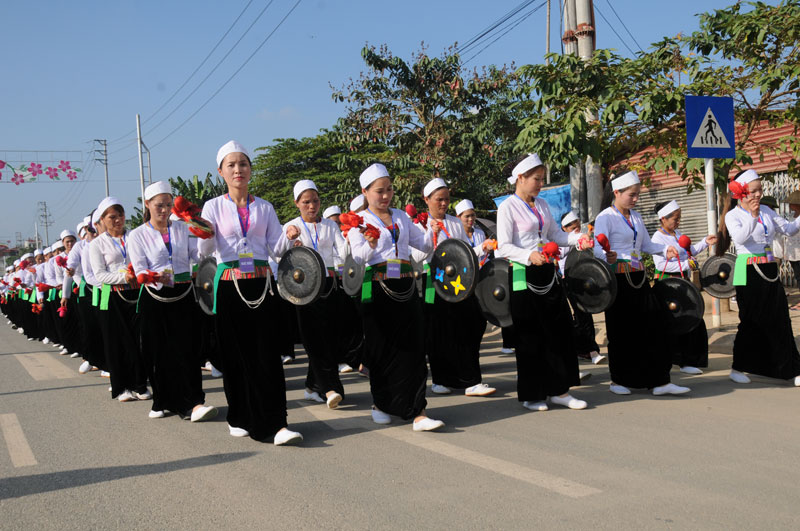
(HBO) – The Hoa Binh provincial People’s Committee recently issued Plan No. 65/KH-UBND on implementing the project on preserving and bringing into play the value of outstanding intangible cultural heritage elements of local ethnic groups for 2020-2030. The project covers prominent intangible cultural heritage items of the Muong, Thai, Tay, Dao and Mong ethnic minority groups in 10 district-level localities of the province.
 The
gongs of the Muong ethnic group are among the outstanding intangible heritage
elements in Hoa Binh province.
The
gongs of the Muong ethnic group are among the outstanding intangible heritage
elements in Hoa Binh province.
The project for 2020-2030 consists of four
sub-projects which focus on listing; collecting and documenting; introducing,
popularising and teaching; and building a database on outstanding intangible
cultural heritage elements of ethnic groups in Hoa Binh.
In its implementation plan, the provincial
administration set several main tasks, including collecting documents and
artefacts linked with the intangible cultural heritage elements, and completing
heritage listing and documentation.
Relevant agencies are set to compile scientific
dossiers on 10 outstanding elements to seek the Ministry of Culture, Sports and
Tourism’s recognition of them as part of the national intangible cultural
heritage. They will also finalise a dossier on the Mo Muong Hoa Binh to be
submitted to UNESCO to seek inscription in the list of intangible cultural
heritage of humanity.
Local authorities will also carry out some
teaching projects for the art of Muong gong playing, the building of
traditional stilt houses of the Muong ethnic group, the Thuong Dang and Bo Meng
singing, the ancient calendar of Muong people, and the Khap singing of the Tay
and Thai communities.
Publications introducing the heritage elements
will also be compiled, published and distributed. Besides, in-depth training in
heritage collection, preservation, display, performance and communications will
be provided for specialised staff members at the provincial Department of
Culture, Sports and Tourism, and in localities.
The provincial People’s Committee assigned the
Department of Culture, Sports and Tourism to coordinate with the Department of
Finance, the Department of Information and Communications, the province’s Radio
and Television Station, the Hoa Binh Newspaper, the Board for Ethnic Minority
Affairs, the district-level People’s Committees to build annual implementation
plans. The agencies and individuals in charge of the issue were also ordered to
create conditions for relevant sides to fulfill their tasks./.
With an increasingly vibrant and widespread emulation movement aimed at building cultured residential areas and cultured families, Yen Thuy District has been making steady progress toward improving both the material and spiritual well-being of its people, while fostering a civilized, prosperous, beautiful, and progressive community.
Once lacking recreational spaces and community facilities, Residential Group 2 in Quynh Lam Ward (Hoa Binh City) has recently received attention for the construction of a new, spacious, and fully equipped cultural house. The project followed the model of state support combined with public contributions in both labor and funding.
The "All people unite to build cultural life" movement, which has been effectively integrated with Kim Boi district’s socio-economic development goals, is fostering a lively spirit of emulation across local residential areas, hamlets, villages, public agencies, and enterprises. In addition, through the initiative, traditional cultural values are being preserved and promoted, while community solidarity and mutual support in poverty reduction and economic development are being strengthened.
A working delegation of the Hoa Binh provincial People’s Committee led by its Permanent Vice Chairman Nguyen Van Toan on June 11 inspected the progress of a project to build the Mo Muong Cultural Heritage Conservation Space linked to tourism services in Hop Phong commune, Cao Phong district.
Born and growing in the heroic land of Muong Dong, Dinh Thi Kieu Dung, a resident in Bo town of Kim Boi district, in her childhood was nurtured by the sweet lullabies of her grandmother and mother. These melodies deeply imprinted on her soul, becoming an inseparable part of her love for her ethnic group's culture. For over 20 years, this love for her hometown has driven Dung to research, collect, and pass down the cultural values of the Muong people to future generations.
In the final days of May, the Ethnic Art Troupe of Hoa Binh Province organized performances to serve the people in remote, mountainous, and particularly disadvantaged areas within the province. These were not just ordinary artistic shows, but they were the meaningful journeys aimed at spreading cultural values, enhancing the spiritual life of the people and contributing to the preservation of ethnic minority cultural identities.



 The
gongs of the Muong ethnic group are among the outstanding intangible heritage
elements in Hoa Binh province.
The
gongs of the Muong ethnic group are among the outstanding intangible heritage
elements in Hoa Binh province.